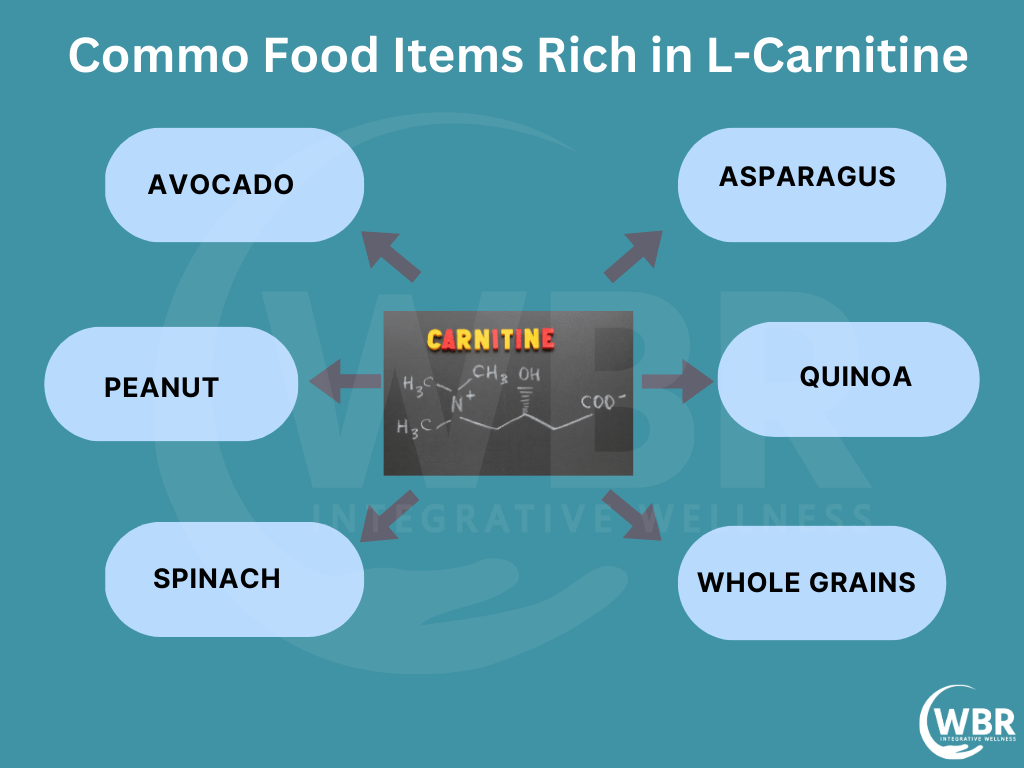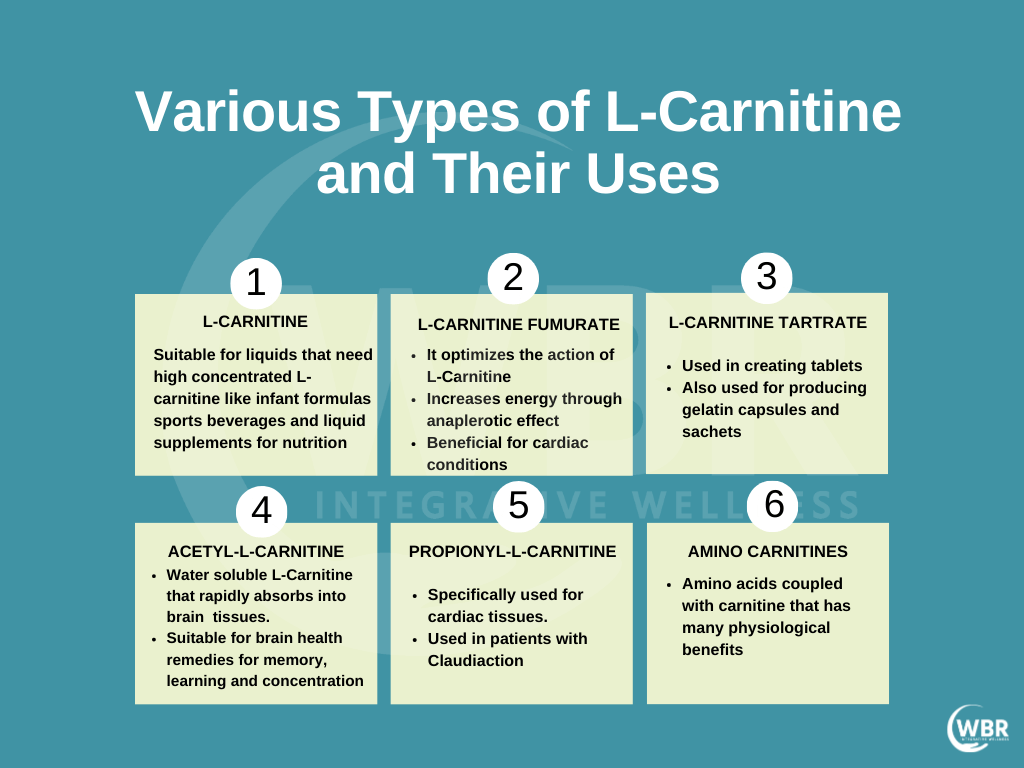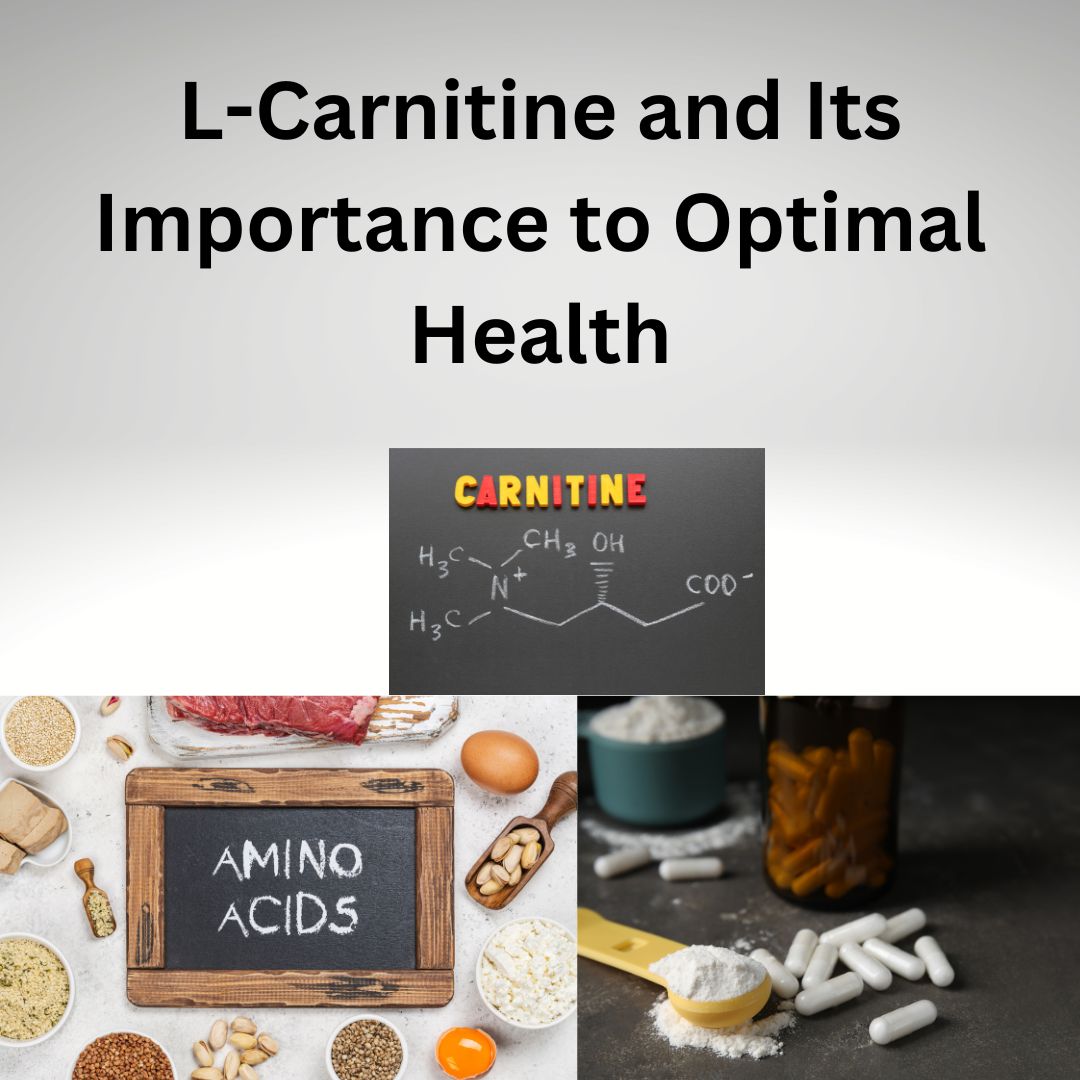L- Carnitine: Clinical Importance in Cardiovascular, Chronic Fatigue, Neuropathy and Weightloss
L-Carnitine is a naturally occurring amino acid that plays a vital role in maintaining optimal health. It is primarily responsible for transporting fatty acids into the mitochondria, where they are converted into energy. L-Carnitine has numerous health benefits, including improved exercise performance, decreased muscle damage, and improved recovery time. It also helps with weight loss, heart health, and brain function. Despite its many benefits, the human body does not produce sufficient quantities of L-Carnitine and humans get it through diet or supplementation. For those looking to enhance their health and wellness, incorporating L-Carnitine into their routine may be a simple and effective solution.
Why L-Carnitine Deficiency
L-Carnitine deficiency in humans occurs due to many factors. The human body is capable of producing L-Carnitine, but not in sufficient quantities to meet the body’s needs. This is why it is important to obtain L-Carnitine through diet or supplementation. One common cause of L-Carnitine deficiency is a genetic disorder that affects the body’s ability to produce or transport L-Carnitine. Another cause is a diet that is low in L-Carnitine-rich foods, such as red meat and dairy products. Vegetarians and vegans, who consume little to no animal products, are at a higher risk of L-Carnitine deficiency. Additionally, certain medications, such as statins reduce L-Carnitine levels in the body. Ageing also leads to a decline in L-Carnitine production, increasing the risk of deficiency in older individuals. It is important to understand the causes and risk factors for L-Carnitine deficiency to ensure adequate intake and maintain optimal health.
Signs of L-Carnitine Deficiency
L-Carnitine deficiency often leads to an accumulation of free fatty acids in the cytoplasm of cells which leads to some symptoms of deficiency. Here are some of the common signs and symptoms of L-Carnitine deficiency.
- Hypoglycaemia
- Progressive Myasthemia
- Hypotonia
- Fatigue
- Cardiomyopathy
- Congestive Heart Failure
- Encephalopathy
- Hepatomegaly
- Neurosmuscular Disorders
- Muscle Fatigue and Cramps

Common Foods Containing L-Carnitine
L-Carnitine is primarily found in animal-based foods such as red meat, poultry, and dairy products. Vegetarians and vegans who do not consume these foods may have a higher risk of L-Carnitine deficiency. However, there are a few plant-based sources of L-Carnitine, although they are not as rich in amino acids as animal-based sources. Some common vegetarian foods containing L-Carnitine include:
- Avocado
- Asparagus
- Peanuts
- Quinoa
- Tempeh
- Whole grains
- Spinach
Vegetarians and vegans need to be aware of these sources of L-Carnitine and include them in their diet to maintain adequate intake. However, it is still recommended that they consider taking L-Carnitine supplements to ensure sufficient levels of the amino acid in their bodies.

Main Actions
Cellular energy production: L-carnitine is an amino acid that plays a critical role in the production of cellular energy by transporting fatty acids into mitochondria, where they get oxidized and used as a fuel source.
Increases Blood Sugar Level: It also helps to improve blood sugar levels by promoting the uptake of glucose into cells and enhancing insulin sensitivity.
Supports Cellular Function and Integrity: In addition to its role in energy production and glucose metabolism, L-carnitine also supports cellular function and integrity by protecting against oxidative stress, inflammation, and other forms of cellular damage.
Prevents Apoptosis: It also helps to prevent apoptosis, or programmed cell death, by regulating the expression of genes involved in cell survival and growth.
Neuroprotective: L-carnitine has neuroprotective effects, helping to protect the brain and nervous system from damage caused by various factors, including oxidative stress, inflammation, and excitotoxicity. It also improves cognitive function and memory, and has been used in the treatment of various neurological disorders, including Alzheimer’s disease, Parkinson’s disease, and multiple sclerosi
Antioxidants: L-Carnitine has antioxidant properties, which means it helps to protect the cells against damage caused by free radicals. Free radicals are highly reactive molecules that damage cellular structures and contribute to the development of various diseases, including cancer, heart disease, and ageing. Antioxidants, such as L-Carnitine, help to neutralize free radicals and prevent cellular damage. By acting as an antioxidant, it helps to improve overall health and reduces the risk of developing certain diseases. Additionally, by reducing cellular damage caused by free radicals, it also helps to enhance athletic performance, improve recovery time following exercise, and support weight loss.
Biological Effects of L-Carnitine
L-Carnitine is a naturally occurring amino acid that plays a vital role in the human body. It has several biological effects that contribute to optimal health, including:
- Fat metabolism: It helps transport long-chain fatty acids into the mitochondria, which are burned for energy.
- Exercise performance: L-Carnitine improves exercise performance, delays fatigue, and enhances recovery.
- Heart health: It also positively impacts heart health by reducing oxidative stress and improving blood flow.
- Weight management: It helps with weight management by increasing fat burning and reducing fat storage.
- Brain function: L-Carnitine improves cognitive function and reduces symptoms of depression and anxiety.
- Muscle function: It improves muscle function, decreases muscle damage, and enhances recovery time.
Physiological Effects of L-Carnitine
There are many physiological effects of L-Carnitine on the human body. Let us look at some of the most common physiological effects of L-Carnitine.
Mitochondrial Oxidation of Long-Chain Fatty Acids
L-Carnitine plays a critical role in the mitochondrial oxidation of long-chain fatty acids. It helps transport these fatty acids into the mitochondria, which are burned for energy. This process is essential for maintaining energy levels and for promoting the breakdown of stored fat. By increasing the transport of fatty acids into the mitochondria, it helps the body use stored fat as a source of energy, which contributes to weight loss and improved exercise performance. Additionally, by reducing the accumulation of toxic byproducts that result from fatty acid oxidation, it helps protect against cellular damage and improves overall health.
Scavenger System for Acyl Groups
In addition to its role in the mitochondrial oxidation of long-chain fatty acids, L-Carnitine also functions as a scavenger system for acyl groups. Fatty acids release toxic products, known as acyl groups. They accumulate and cause cellular damage. It acts as a scavenger, removing these acyl groups from the cells and transporting them to the liver for disposal. This helps to protect the cells from damage and contributes to the maintenance of overall health. By reducing the accumulation of toxic byproducts, L-Carnitine also helps to improve cellular function, enhance energy levels, and promote weight loss.
Lactic Acid Clearance
L-Carnitine helps in the clearance of lactic acid produced during exercise. It contributes to muscle fatigue and discomfort. Lactic acid is a result of anaerobic metabolism, which occurs when the body’s demand for energy exceeds its supply of oxygen. During intense exercise, lactic acid builds up in the muscles, leading to a decrease in pH and an increase in muscle fatigue. It also increases the clearance of lactic acid from the muscles, which helps to delay the onset of muscle fatigue and improve exercise performance. Additionally, by reducing the accumulation of lactic acid, it helps to reduce muscle soreness and improve recovery time following exercise
Metabolism of Branched-Chain Amino Acids
L-Carnitine also plays a role in the metabolism of branched-chain amino acids (BCAAs), which are important for muscle growth and repair. BCAAs, such as leucine, isoleucine, and valine, are metabolized primarily in the muscles, and the byproducts of their metabolism contribute to muscle fatigue and discomfort. L-Carnitine improves the metabolism of BCAAs, reducing the accumulation of their toxic byproducts and helping to maintain muscle function and reduce muscle damage. By improving the metabolism of BCAAs, it also helps to enhance athletic performance and improve recovery time following exercise. Additionally, by reducing the accumulation of toxic byproducts, it protects against cellular damage and supports overall health.
Ammonia Detoxification
L-Carnitine also plays a role in ammonia detoxification. Ammonia is a toxic byproduct of protein metabolism that accumulates in the body and causes cellular damage. High levels of ammonia lead to fatigue, weakness, confusion, and in severe cases, coma or death. It also helps in the detoxification of ammonia by acting as a transporter of toxic ammonia byproducts from the cells to the liver for disposal. By reducing the accumulation of ammonia in the cells, L-Carnitine protects against cellular damage and improves overall health.
L-Carnitine and the Heart
L-Carnitine has several potential benefits for heart health. Some studies suggest that supplementing with L-Carnitine improves cardiovascular function, reduces the risk of heart disease, and lowers cholesterol levels. Additionally, it improves blood flow and increases the delivery of oxygen to the heart, which helps to reduce the risk of heart attack and stroke. L-Carnitine helps protect against oxidative stress and cellular damage, which contributes to the development of heart disease. However, more research is needed to fully understand its effects on heart health and to determine the optimal dosages for its use. It is important to speak with a healthcare provider before taking any new supplements, including L-Carnitine, to determine if it is appropriate for your individual needs.

Clinical Uses of L-Carnitine
-
Cardiovascular hypertension: L-Carnitine has been shown to reduce blood pressure in people with hypertension, which is a significant risk factor for cardiovascular disease.
-
Cancer: L-Carnitine has been studied for its potential to improve the effectiveness of chemotherapy and reduce the side effects of cancer treatment.
-
Vascular disease: L-Carnitine has been shown to improve blood flow and reduce inflammation in people with peripheral arterial disease, a condition that can lead to reduced blood flow to the limbs.
-
Neuropathy: L-Carnitine supplementation may improve nerve function and reduce pain in people with diabetic neuropathy, a type of nerve damage that can occur in people with diabetes.
-
Fatigue: L-Carnitine supplementation may help to reduce fatigue and improve exercise performance in people with chronic fatigue syndrome and other conditions.
-
ADHD: Some studies suggest that L-Carnitine supplementation may improve symptoms of attention deficit hyperactivity disorder (ADHD) in children.
-
Diabetes: L-Carnitine may improve insulin sensitivity and glucose metabolism in people with diabetes, and has been studied for its potential to reduce complications associated with the condition.
-
IBD: L-Carnitine helps to reduce inflammation and improve symptoms in people with inflammatory bowel disease (IBD).
-
Weight Loss: L-Carnitine has potential to improve weight loss and body composition in overweight and obese individuals.
-
Aging: L-Carnitine helps to reduce age-related declines in cognitive function and physical performance, and has potential to improve overall health and longevity in older adults.
Supplements
Here are some supplement guidelines for L-Carnitine for different conditions. To be avoided in case of chronic liver disease, seizures/epilepsy.
- Cardiovascular disorders: 2g/day for at least 3 months(improves exercise tolerance and speeds recovery)
- Chronic Fatigue Syndrome: 1 g three times daily
- Fertility: 2-3 g/day
- Peripheral vascular disease: 2g/day
- Aging: 2g/day or twice daily
Note: Supplements should only be taken after consulting a healthcare professional
Conclusion
L-Carnitine is a naturally occurring substance that plays a vital role in several important physiological processes. It help in the metabolism of long-chain fatty acids, the clearance of lactic acid, and the detoxification of ammonia. It also has antioxidant properties and shows to have potential benefits for heart health. More research is needed to fully understand the effects of L-Carnitine on health. But current evidence suggests that it may play an important role in maintaining optimal health and wellness. However, it is important to speak with a healthcare provider before taking any new supplements, including L-Carnitine. It helps to determine if it is appropriate for your individual needs.
Additionally, for vegetarian individuals, it is important to obtain it from dietary sources, such as dairy products, avocados, and peanuts, or through supplementation to ensure adequate intake. Overall, it is a fascinating and potentially beneficial substance that deserves further investigation to fully understand its role in optimal health.








